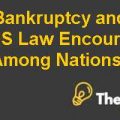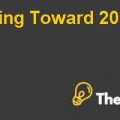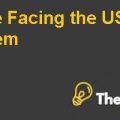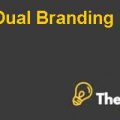Nelson Paper Products, Inc Case Study Solution
Here, the reason of Northwest Pacific Lumber Company to merge with Nelson Paper Products was to go public, which was decided in the year 1987 that Northwest Pacific Lumber Company would either go public by Introducing the Initial Public Offering (IPO) or sell out its operations to any publically traded company in handsome selling price.
For financial perspective, Table 1.1 and Table 1.2 are showing the financial calculations, which are made to find the enterprise value of Northwest Pacific Lumber Company at the Weighted Average Cost of Capital (WACC) of 10 percent, and growth rate of 7.5 percent, the enterprise value is 108.32 million dollars, while the quoted price from Nelson Paper Products, Inc. is 95 million dollars. In short, that the enterprise value is 1.22 times of the quoted price from Nelson Paper Products, Inc.
So, in order to make the decision that either Nelson Paper Products, Inc. should acquire Northwest Pacific Lumber Company or not; the recommendation is drawn after performing the strategic and financial analysis on Northwest Pacific Lumber Company that Nelson Paper Products, Inc. should invest in the Northwest Pacific Lumber Company because its enterprise value is higher than its quoted price.
Table 1.1: Calculations for Weighted Average Cost of Capital (WACC)
| WACC Calculations | |
| Tax Rate | 33.64% |
| Debt yield | 8.98% |
| Risk Free Rate | 3.45% |
| Market Rate of Return | 11% |
| Market Risk Premium | 7.55% |
| Beta | 1.01 |
| Equity Yield | 11% |
| Total Equity | 94.1 |
| Total Debt | 37.4 |
| Equity Ratio | 0.72 |
| Debt Ratio | 0.28 |
| After Tax Cost of Debt | 5.96% |
| Growth Rate | 7.50% |
| WACC | 10% |
Table 1.2: Calculations for Free Cash Flows (FCF)
| 1993 | 1994 | 1995 | 1996 | |
| EBIT | 7.1 | 8.8 | 10.8 | 11.5 |
| Interest expense | 0.5 | 0.5 | 0.5 | 0.5 |
| Profit before taxes | 6.6 | 8.3 | 10.3 | 11.0 |
| Taxes | 2.2 | 2.8 | 3.5 | 3.7 |
| Profit after taxes | 4.4 | 5.5 | 6.8 | 7.3 |
| Depreciation | 6.3 | 6.0 | 5.7 | 5.5 |
| Increase in net working capital | 1.5 | 3.0 | 3.0 | 1.5 |
| Capital expenditure | 2.5 | 5.0 | 5.0 | 7.3 |
| Free Cash Flows | 6.7 | 3.5 | 4.5 | 4.0 |
| Terminal Value | 188.64 | |||
| Total Cash Flows | 6.7 | 3.5 | 4.5 | 192.6 |
| Discount Factor | 0.91 | 0.83 | 0.76 | 0.69 |
| Discounted Cash Flows | 6.07 | 2.87 | 3.38 | 133.41 |
| Total Value of the Company | 145.72 | |||
| Less: Total Debt | 37.4 | |||
| Enterprise Value | 108.32 |
Table 1.3: Financing Alternatives
| 100% Debt | 100% Equity | 50 - 50 | 75m Debt 20m Equity | ||
| Tax Rate | 33.64% | 33.64% | 33.64% | 33.64% | 33.64% |
| Debt yield | 8.98% | 8.98% | 8.98% | 8.98% | 8.98% |
| Risk Free Rate | 3.45% | 3.45% | 3.45% | 3.45% | 3.45% |
| Market Rate of Return | 11% | 11% | 11% | 11% | 11% |
| Market Risk Premium | 7.55% | 7.55% | 7.55% | 7.55% | 7.55% |
| Beta | 1.01 | 1.01 | 1.01 | 1.01 | 1.01 |
| Equity Yield | 11% | 11% | 11% | 11% | 11% |
| Total Equity | 94.1 | 94.1 | 189.1 | 141.6 | 114.1 |
| Total Debt | 37.4 | 132.4 | 37.4 | 84.9 | 112.4 |
| Equity Ratio | 71.56% | 0.58 | 0.17 | 0.37 | 0.50 |
| Debt Ratio | 28.44% | 0.42 | 0.83 | 0.63 | 0.50 |
| After Tax Cost of Debt | 5.96% | 5.96% | 5.96% | 5.96% | 5.96% |
| WACC | 10% | 9% | 7% | 7.88% | 8.50% |
Capital Structuring of Nelson Paper Products, Inc.:
The above mentioned financing alternatives show that the 100 percent equity financing is best for the company, which will reduce the Weighted Average Cost of Capital (WACC) from 10 percent to 7 percent.
The company requires 66 million dollars from external financers, and the requirement of external financing is increasing year by year, so, in the current year, debt financing is best for the company, because it reduces the Weighted Average Cost of Capital (WACC) for the company.
By keeping the long range capital structure into consideration;the company should stop paying dividend for some upcoming years in order to avoid the long range capital structure by investing through internal funding in future growth opportunities...............
This is just a sample partical work. Please place the order on the website to get your own originally done case solution.










